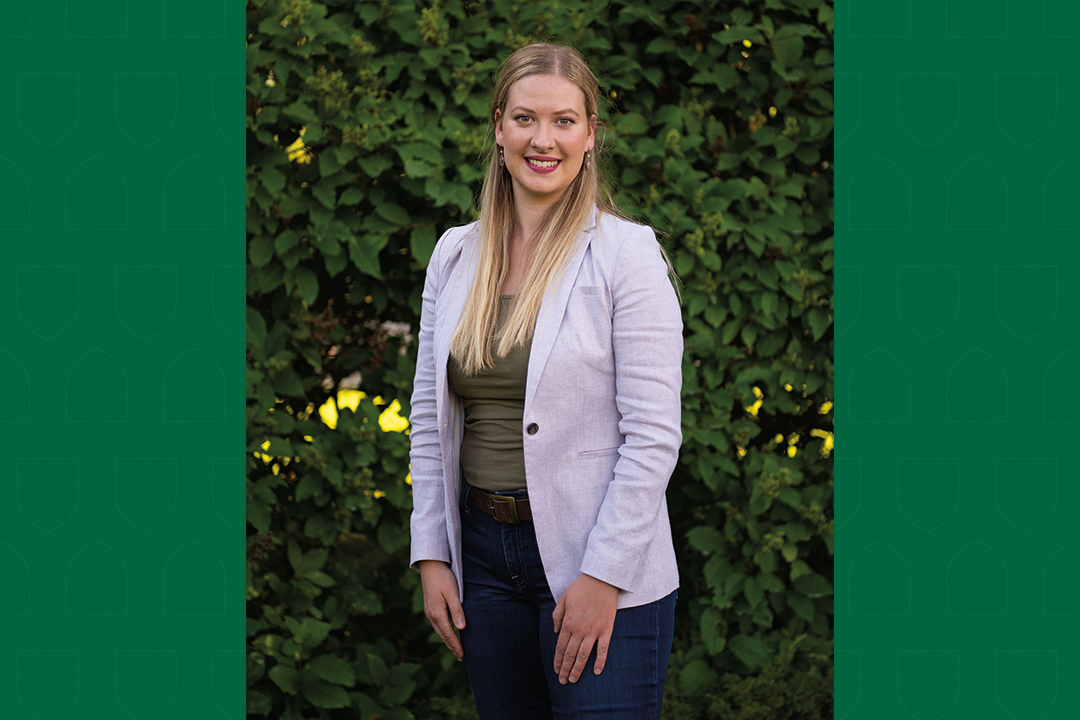
Mentorship program puts vet student in cattle producers’ shoes
Growing up on her family’s commercial cow-calf operation in rural Manitoba helped Sarah Jensen gain first-hand experience with the daily challenges facing livestock producers.
By Lynne GunvilleNow, the University of Saskatchewan (USask) veterinary student plans to broaden her understanding of Canada’s cattle industry even further by participating in the Cattlemen’s Young Leaders (CYL) mentorship program.
“As a veterinarian, I hope to be working with producers of both cow-calf and feedlot operations on a daily basis, so I need to know what it’s like to be in their shoes,” says Jensen, one of 16 young people selected for the 2020-21 version of the mentorship initiative.
Supported by the Canadian Cattlemen’s Association, the CYL program offers industry training and interest-specific mentorship that’s aimed at inspiring youth to become involved and active in the Canadian cattle industry.
“A goal of mine [for the CYL program] is to understand the feedlot production system as a business from producers’ perspectives so I can gain an appreciation of the business decisions and risk analyses they are dealing with,” says Jensen, who began her first year at the Western College of Veterinary Medicine (WCVM) in August 2020.
During the CYL program, Jensen will have regular online meetings with her mentors Bryan and Stuart Thiessen. Their family-owned business operates Namaka Farms, which includes feedlot and farming operations in Alberta and Saskatchewan.
“I have a lot to learn about the feedlot industry and feedlot medicine, so being able to fill those gaps now while I have the opportunity to work with Bryan and Stuart will make me a more knowledgeable student and attentive vet once I’m out working with producers in the field,” says Jensen.
She’s particularly pleased that the Thiessens share her interest in cattle welfare and health; in fact, they’ve set those issues as priorities for their operations. For example, Namaka Farms is involved in a research project investigating antimicrobial resistance — a topic of interest to Jensen who wants to learn more about antimicrobial use and surveillance in feedlots. She also hopes to explore some of the major production-limiting diseases that challenge the Canadian feedlot sector.
CYL program participants usually attend various events that include tours and conferences throughout North America, but because of COVID-19 travel restrictions, participants have been using virtual options to meet and share their goals and experiences so far.
Jensen anticipates future trips to Alberta where she can meet the Thiessens in person and tour their feedlot operation. She also hopes to spend a day with the feedlot veterinarians — an opportunity for her to observe and ask questions.
“I’d like to see how the day of a feedlot vet differs from someone who’s working with primarily cow-calf operations,” Jensen explains.
Jensen’s interest in cattle dates back to the many hours she spent helping on her family’s commercial cow-calf operation near Arborg, Man. Calving season was always a highlight for her, and she vividly remembers helping her dad deliver triplet calves when she was only five years old.
While growing up in the farming community, Jensen volunteered at the annual fair and rodeo and served as youth representative for the Arborg Agricultural Society during high school. When Jensen went on to study at the University of Manitoba, she began a part-time job at Manitoba’s Chief Veterinary Office (CVO) in 2017. As she worked on animal health and animal welfare projects with the veterinary team, Jensen saw another side of the veterinary profession.
“I’d always felt that veterinary medicine was something I could do, but I loved writing and communicating with people, and that’s why a career in journalism or human medicine was attractive to me,” says Jensen. “Then I realized veterinarians do all of that. Once I learned about the role veterinarians have in contributing to the One Health initiative, it set in stone what I wanted to do.”
In addition to her part-time work, Jensen volunteered at Central Veterinary Services, a mixed animal practice in Oak Bluff, Man. In 2019, she also gained some research experience as an undergraduate summer student at the U of M. Supported by a research award from the Natural Science and Engineering Research Council of Canada, Jensen helped study the use of strategic supplementation to improve beef cattle performance and expand the use of pasture-based production systems.
While Jensen is enjoying the chance to explore all avenues of veterinary medicine, returning to Manitoba and working in a rural mixed practice is high on her option list. Combining all of her interests — perhaps by working in practice first and then pursuing epidemiological research around emerging diseases and antimicrobial resistance — would also make a good fit.
“I know that whether I become an epidemiologist or not, [by] working as a production animal vet I’ll also be able to contribute to One Health ... by ensuring food safety and practising antimicrobial stewardship. That’s ultimately my end goal,” says Jensen.
